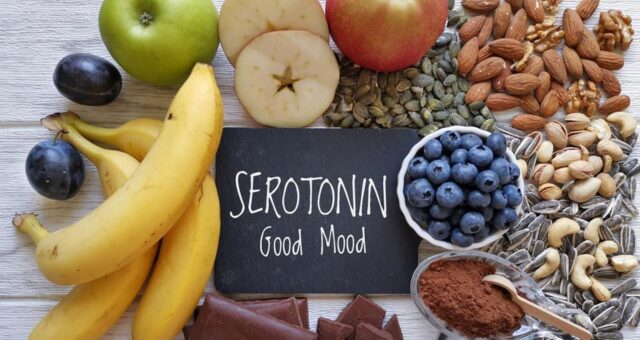Medically Reviewed by Lucas Rosa, PhD in Molecular Biology
When you think about happiness, calmness, and emotional balance, one key player behind the scenes is serotonin.
Often called the “feel-good” chemical, serotonin affects everything from your mood and sleep to digestion and overall well-being.
But what exactly is serotonin? And how can you naturally keep it balanced? Let’s break it all down in a way that’s practical, easy to understand, and useful for your day-to-day life.
What Is Serotonin?
Serotonin is a neurotransmitter and hormone, which means it’s a chemical messenger that helps transmit signals in your brain and throughout your body. It plays a major role in regulating mood, anxiety, sleep, digestion, memory, and even sexual function. (1)
Unlike what many people think, serotonin isn’t only found in the brain. In fact, about 90% of serotonin is made in your gut! The rest is produced in the brain, where it affects emotional balance and mental health.
When your serotonin levels are balanced, you feel calm, focused, and emotionally stable. But if levels drop too low, it can lead to mood swings, depression, anxiety, and even trouble sleeping.

What Does Serotonin Do in the Body?
Here are some key functions of serotonin: (2)
1. Mood Regulation
Serotonin is best known for its role in mood. Higher levels are linked to feelings of happiness and calmness, while low levels are associated with sadness and irritability.
2. Sleep Support
Serotonin helps regulate your sleep-wake cycle by influencing melatonin, the hormone that controls your internal clock.
3. Appetite and Digestion
In the gut, serotonin helps control bowel movements and appetite. This is why digestive issues sometimes show up alongside stress or depression.
4. Pain Perception
Serotonin helps manage how you feel pain. Low levels may increase your sensitivity to pain and discomfort.
5. Sexual Function
Balanced serotonin supports healthy sexual desire and performance. Too much or too little can interfere with libido.
Signs Your Serotonin Might Be Low
Some common symptoms of low serotonin levels include:
- Feeling Anxious, Depressed, or Moody
- Difficulty Sleeping or Staying Asleep
- Food Cravings (especially carbs and sugar)
- Poor Digestion or Frequent Gut Issues
- Low Energy or Motivation
- Increased Sensitivity to Pain
If you’re noticing several of these symptoms regularly, your serotonin levels could be out of balance.

Natural Ways to Keep Serotonin Balanced
Balancing your serotonin levels doesn’t have to involve prescriptions. In fact, the most effective, long-term approach is building daily habits that naturally support serotonin production.
Here are seven powerful, science-backed strategies to help you keep your serotonin levels in check:
1. Get Daily Sunlight Exposure
Sunlight triggers serotonin release through receptors in your eyes. When natural light hits your retina, it signals the brain to boost serotonin production.
This is one reason people tend to feel happier on bright, sunny days. You should aim for at least 15–30 minutes of natural sunlight each morning, ideally before 10 a.m. (3)
- Tip: As you are outside, try “grounding”, walking barefoot in grass or sand. It can help reduce stress, helping serotonin work more effectively. (4)
2. Eat Foods Rich in Tryptophan
Serotonin is made from the amino acid tryptophan, which must be obtained through your diet. While serotonin itself can’t cross into the brain, tryptophan can, and when paired with the right nutrients, it helps your body make more serotonin.
Tryptophan-rich foods include turkey, eggs, salmon, chicken, tofu, cheese, nuts, seeds, and oats. (5)
- Tip: Pair these with complex carbs like sweet potatoes, brown rice, or fruit. Carbs help tryptophan cross the blood-brain barrier more efficiently.
3. Exercise – Especially Aerobic and Rhythmic Movement
Physical activity boosts serotonin synthesis and release, particularly in the brain. Rhythmic, repetitive exercises like running, biking, swimming, or dancing are especially effective.
Aim for 30–45 minutes of moderate aerobic activity at least 4–5 times per week. (6)
- Fun Alternatives: Bouncing on a trampoline, brisk walking with music, or even dancing in your living room all count!
4. Support Your Gut Health
Your gut is home to trillions of microbes that play a huge role in serotonin production. An unhealthy gut can disrupt this process, leading to poor serotonin signaling and even mood imbalances.
Eat More:
- Probiotic-Rich Foods (yogurt, kefir, kimchi, sauerkraut)
- Prebiotic Fibers (onions, garlic, bananas, asparagus)
- Fermented Foods
Avoid: Excess sugar, highly processed foods, and artificial sweeteners, which can harm your microbiome.
5. Practice Gratitude, Mindfulness, and Meditation
Mindfulness practices help change the focus of our brains. Meditation, deep breathing, journaling, prayer, and gratitude can help raise serotonin levels naturally by shifting your focus from stress to calm, contentment, and presence.
- Start Small: Each night, write down three things you’re grateful for. Even 5 -10 minutes of focused breathing or quiet reflection daily can rewire brain chemistry over time.

6. Prioritize Quality Sleep
Sleep and serotonin work in a cycle. Serotonin helps produce melatonin (the sleep hormone), and getting deep, restful sleep helps your body regulate and restore serotonin levels.
Good Sleep Hygiene includes:
- A consistent sleep schedule (even on weekends)
- Avoiding screens 1 hour before bed
- Keeping your room dark, cool, and quiet
Bonus: Natural sleep aids like magnesium, chamomile tea, or a warm bath before bed can support serotonin indirectly.
7. Nurture Meaningful Connections
Human touch, love, and positive interactions directly stimulate serotonin release. This could be as simple as having a heartfelt conversation, hugging a loved one, or laughing with friends. Even small acts such as a smile, a kind word, or helping someone out can lift your serotonin levels.
Loneliness and isolation, on the other hand, can lower serotonin and increase stress. So even if you’re busy, find time for connection.
Conclusion
Serotonin is a tiny chemical with a big impact. It affects how you feel, sleep, digest, and function every day.
The beautiful part? You have the power to boost your serotonin levels naturally by moving your body, feeding your gut, sleeping well, soaking in sunlight, and nurturing your mental and emotional health.
Remember, health isn’t just about avoiding illness, it’s about thriving, feeling joy, and being in balance. And serotonin is a key part of that balance.
References
- Bamalan OA, Moore MJ, Al Khalili Y. Physiology, Serotonin. [Updated 2023 Jul 30]. In: StatPearls [Internet]. Treasure Island (FL): StatPearls Publishing; 2025 Jan-. Available from: https://www.ncbi.nlm.nih.gov/books/NBK545168/.
- Cleveland Clinic. “Serotonin.” Cleveland Clinic, 18 Mar. 2022, my.clevelandclinic.org/health/articles/22572-serotonin. https://my.clevelandclinic.org/health/articles/22572-serotonin.
- Lambert GW, Reid C, Kaye DM, Jennings GL, Esler MD. Effect of sunlight and season on serotonin turnover in the brain. Lancet. 2002 Dec 7;360(9348):1840-2. doi: 10.1016/s0140-6736(02)11737-5. PMID: 12480364. https://pubmed.ncbi.nlm.nih.gov/12480364/.
- Menigoz, Wendy, et al. “Integrative and Lifestyle Medicine Strategies Should Include Earthing (Grounding): Review of Research Evidence and Clinical Observations.” EXPLORE, vol. 16, no. 3, Nov. 2019, www.sciencedirect.com/science/article/pii/S1550830719305476, https://doi.org/10.1016/j.explore.2019.10.005. https://www.sciencedirect.com/science/article/pii/S1550830719305476.
- Jenkins TA, Nguyen JC, Polglaze KE, Bertrand PP. Influence of Tryptophan and Serotonin on Mood and Cognition with a Possible Role of the Gut-Brain Axis. Nutrients. 2016 Jan 20;8(1):56. doi: 10.3390/nu8010056. PMID: 26805875; PMCID: PMC4728667. https://pmc.ncbi.nlm.nih.gov/articles/PMC4728667/.
- Heijnen S, Hommel B, Kibele A, Colzato LS. Neuromodulation of Aerobic Exercise-A Review. Front Psychol. 2016 Jan 7;6:1890. doi: 10.3389/fpsyg.2015.01890. PMID: 26779053; PMCID: PMC4703784. https://pmc.ncbi.nlm.nih.gov/articles/PMC4703784/.
Check Out
HF Swaps
Better products for better hormone health.









